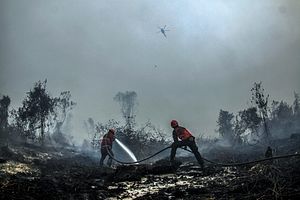On Monday, 16-year-old Swedish environmental activist Greta Thunberg and 15 other teens filed a complaint with the United Nations as the General Assembly convened in New York City. The plaintiffs alleged that five of the world’s major economies violated their rights under the Convention of the Rights of the Child.
During the press conference, Thunberg made a passionate plea: “People are suffering, people are dying, entire ecosystems are collapsing. We are in the beginning of a mass extinction and all you can talk about is money and fairytales of eternal economic growth.”
Half a world away, Indonesia is grappling with the intersection of economic growth and environmental sustainability. Its rainforest haze crisis is worsening — in Jambi, Sumatra, the streets are blanketed in red haze in daytime, like a “scene from a dystopian future.”
Sadly, this is our present. This is merely a snapshot of the current environmental crisis.
The culprit: Palm oil production.
The Indonesian government’s efforts to stop the fires are described by Quartz as “ironic” given their efforts to protect the palm oil industry.
As the world’s largest palm oil producer, global palm oil production is an important source of income and a major contributor of economic growth for the Southeast Asian archipelago nation. Earlier this year, the leaders of Indonesia and Malaysia sent a letter to the European Union following the European Commission’s determination that palm oil is no longer considered a renewable transport fuel.
So far, Indonesian police have identified 230 individuals as suspects behind the fires and arrested 185 individuals accused of starting them. But many remain unknown and unidentified; they start these fires on behalf of big corporations. VICE Indonesia aptly described Indonesian officials’ actions as merely “hunting down low-level accomplices” instead of the big players.
Still, the blazes are a persistent problem. They impact Indonesians’ livelihood and pose a security risk — schools and airports are closed, and neighboring countries Malaysia, Brunei, Thailand, and even the Philippines are affected.
The beginning of a mass extinction that Thunberg aptly described is here. So, what are we to do?
First and foremost is awareness. The Amazon rainforest fires caught the attention of the rest of the world when images of the “lungs of the Earth” on fire were posted and reposted on social media. News outlets and social media accounts around the world — including celebrities — covered the issue, offering rationale and consumer-oriented solutions.
With the unrest in Papua and demonstrations amidst extreme legislative changes, Indonesia is going through a lot right now. Those of us who are on the outside, who care about environmental issues, could do the work of spreading awareness on social media platforms so that global news networks eventually pick up the story.
I also offer a consumer-oriented solution. As the most widely consumed vegetable oil on the planet, we may not be aware that we are consuming palm oil. The World Wildlife Fund (WWF) suggests boycotting or avoiding products entirely that contain palm oil could have “worse effects” to the companies that are trying to improve the situation by ethically and responsibly sourcing their palm oil.
We can switch the demand: The Roundtable on Sustainable Palm Oil (RSPO) offers certification to products made with certified sustainable palm oil — simply find products with the RSPO-certified label. You can also find a list of 10 companies that are committed to sourcing sustainable palm oil, including The Hershey Company, Johnson & Johnson, and Dunkin’ Donuts.
At the same time, we can reduce our demand from companies who do not commit to the same sustainable practices. Check out WWF’s Palm Oil Buyers Scorecard that tells you how well companies are doing. If their score is closer to 0, we can change our demand to closely match that number.
Greta Thunberg and her friends’ courage shows us that environmental change — especially in instances where the government fails to sufficiently act — truly is in the palm of our hands.
Oryza Astari is an Indonesian-American masters in international affairs candidate at George Washington University’s Elliott School of International Affairs in Washington, D.C.

































